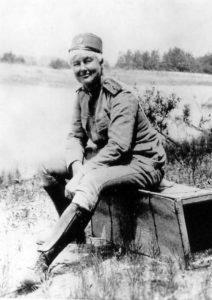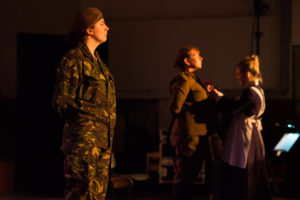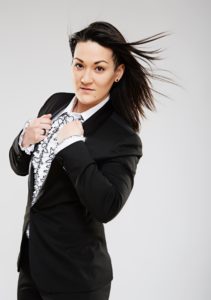Lila Palmer believes that people can gain the strength to break down barriers today by knowing how our ancestors changed the rules that existed in the past.
In 2016, when there was substantial controversy over the announcement that the British Army would accept women in full combat roles, the composer Rose Miranda Hall introduced her to the story of Flora Sandes.

Flora was astonishing. In the early stages of World War I she went to the Balkans to work in an ambulance unit, nursing Serbian troops wounded in their struggle to hold back an Austro-Hungarian offensive.
The campaign was going badly and her unit disintegrated. Instead of seeking safety she became the only British woman to officially serve as a soldier in the Great War.
Lila felt it was odd that people were arguing about whether women could and should take on these kind of roles a full century after Flora had blazed the trail – rising from private to captain and decorated seven times.

But then again, Flora’s story wasn’t exactly well known.
Rose and Lila are helping to change that with their new opera Dead Equal, which is at the heart of this year’s Army@TheFringe programme.
It tells Flora’s story while also following the fate of two 21st-century female British Army medics in Afghanistan – this second thread is fictional but draws on the experiences of women who were there.
But Dead Equal as a production is about more than women in uniform. It is also about the nature and future of opera.

Flora is being played internationally acclaimed queer feminist soprano Teiya Kasahara, who was attracted to the role because, unlike many parts written for women, she is not a victim and doesn’t end up mad, dead or married.
Teiya, Lila, Rose and the rest of Palmer & Hall Music also have broader objectives, including creating operas that appeal to a wider and more diverse audience.
That is partly to do with addressing themes that are of greater relevance to people’s lives.
But it is also about providing opportunities for those whose voices are often not heard – including performers from minority ethnic backgrounds.
Overall they aim to confound people’s expectations of the opera genre and expand our ideas of who opera is made by and for.
Lila believes that the team involved in Dead Equal is what the future of opera should look like.
It features Miranda Cromwell who has led the way in British Theatre in directing the work of diverse female voices.
Then there’s Simone Ibbet-Brown (Jo) who co-founded Hera, which campaigns for greater diversity in opera.
And Teiya is a one-person powerhouse creator-performer.
Indeed it’s a point of pride for Lila that every artist associated with the production has been active in making their corner of the arts a truly representative space as well as being capable of delivering the highest standards of excellence.
- If you’d like to know more then you can visit our website www.Armyatthefringe.org.

































